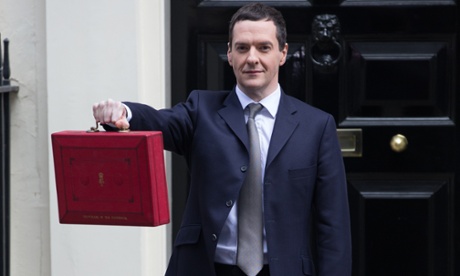
George Osborne is under pressure from the Institute for Fiscal Studies to specify how he planned to cut welfare spending by £12bn in the next parliament, and warned the poor had lost most from the coalition’s benefit changes of the past five years.
Britain’s leading experts on tax and spending also said the pickup in living standards hailed by the chancellor in his budget was the slowest in modern history and “no cause for celebration” – although the IFS did suggest living standards on current projections would be higher in 2015 than 2010, a finding that was hailed by Osborne.
The IFS director, Paul Johnson, said Osborne’s defence against claims that cuts in Whitehall departmental spending will be even bigger after the election than in the current parliament was that he would raise £12bn from welfare savings and £5bn from a fresh crackdown on tax avoidance.
“But it is now almost two years since he announced his intention of cutting welfare spending by £12bn. Since then the main announcement has been the plan not to cut anything from the main pensioner benefits,” Johnson said.
“We have been told about no more than £2bn of the planned cuts to working-age benefits. And, remember, apparently the ‘plan’ is to have those £12bn of cuts in place by 2017-18. It is time we knew more about what they might actually involve.”
Earlier in the day, a senior Conservative minister said the party would not spell out all its welfare cuts until after the general election. David Gauke, the Treasury secretary, was pressed repeatedly on the BBC’s Daily Politics to explain if the Tories would detail their planned welfare cuts beyond the £3bn previously specified.
He replied: “We will set it out nearer the time which will be after the election.” He said such cuts were normally agreed as part of a wider spending review.
The current coalition plans would involve a cut of £30bn in public spending in the first three years of the next parliament. Analysis by the IFS showed that this would mean a cumulative cut of 7.2% in departmental spending by 2017-18. But on the assumption that the NHS, overseas aid and schools would continue to be ringfenced, the cuts for unprotected departments, including the Home Office and the Ministry of Defence, would be 15.7%.
Johnson continued: “The chancellor argues that because he is committed to £12bn of welfare cuts and £5bn of anti-tax-avoidance measures the required cuts to public service spending are much more modest. But if he really wants us to believe that, then he needs to be more explicit about how he actually thinks he can cut welfare spending and raise substantial additional sums from clamping down on tax avoidance.”
Osborne will need unprecedented cuts in welfare to meet targets, said the IFS.
After the three-year squeeze up until 2017-18, the plans published in the budget show a sharp increase in spending in the final year of the next parliament. This is a significant deviation from the blueprint in the autumn statement just three months ago, which saw the size of the state as a percentage of the economy in 2020 at its lowest level since the 1930s. Johnson said “the apparent change in economic philosophy in the three months since the autumn statement is pretty remarkable”.
The IFS also challenged Osborne’s claim in the budget that “we are all in it together”, in its assessment of winners and losers from the benefit changes introduced by the coalition. Johnson said that while those on middle- and upper-middle income benefits had been left “remarkably insulated” on average, benefit cuts had hit those at the bottom of the income distribution, while tax increases had hit hardest those at the top.
Looking at the entire period of tax increases and spending cuts since deficit reduction began under the last Labour government in early 2010, the richest had been the biggest losers. “Looking only at changes implemented by the coalition the poorest have seen the biggest proportionate losses,” Johnson said.
The IFS also adjudicated in the row between the Conservatives and Labour over whether living standards are higher or lower than they were in 2010. Johnson said Osborne and Ed Miliband were looking at different things, with the chancellor able to say that on his measure of household incomes, living standards should be higher by the end of this year than when the coalition came to power. The Labour leader was looking at earnings, he said.
He added average household incomes had just about regained their pre-recession levels. “They are finally rising and probably will be higher in 2015 than they were in 2010, and possibly higher than their 2009 peak. But that still represents by far the slowest recovery in incomes in modern history. Having household incomes crawl back up above pre-recession levels six or seven years after the recession hit is no cause for celebration.”
Shadow chancellor Ed Balls said: “This proves government’s changes have hit the poorest hardest of all. If the Tories want to spend the election campaign telling people they’ve never had it so good, they’re even more out of touch than I thought.”
Conservative sources insisted “the steady-as-she-goes budget” had struck the right note, and predicted Labour would now chase a fantasy that the cuts meant the NHS was under threat.
“It is pure core vote stuff, and will not work because no one believes David Cameron wants to wreck the NHS,” one government source said.

